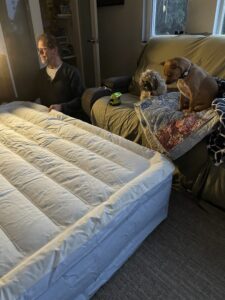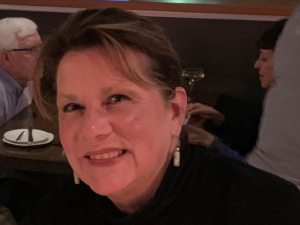By LORI TOBIAS/for YachatsNews
NEWPORT — Friday afternoon, we’d arrived home from the Willamette Valley, where I’d had a doctor’s appointment. I’d watched weather reports for days, gauging the timing of our drive and a coming storm. Now home, I relaxed with the knowledge that we didn’t have to be anywhere.
That night, as the snow began in Corvallis, I checked the weather and noted that while all around us were predictions of snow, we were looking at rain, just rain. It would be cold that night and I figured at worse, we’d have icy roads in the morning, but nothing compared to what others faced.
Early Saturday afternoon, freshly showered, hair soaking, I was dressing to go out for groceries, when a light dimmed, the house quieted. It was barely notable, so much so, I called to my husband, Chan, to see if he’d turned off a light.

Then, I knew. But I wasn’t bothered. Given what was going on around us, I knew it might be a couple of hours. In the 23 years I’ve lived here, I honestly can’t recall any outage of more than 8-10 hours — and that was decades ago.
We moved to Newport in 2000, transplants from Denver, where I was a reporter and Chan was a lineman. Here, he took a job with Central Lincoln Peoples Utility District and I signed on with The Oregonian.
For a number of years we had a spate of wild winter storms — storms that ripped roofs from houses, toppled hundreds of trees, wind gusts to 100 mph. I recall sitting in my office one night as a storm landed, listening to the scanner as trees fell on power lines, the lines dropping into the brush, igniting fires. I warned my editor that I would likely lose power and when a transformer outside my window blew, sure enough, the world went dark. But in the morning, the power was back on.
And that’s how it was for years, an outage here, an outage there, no big deal.
While I had little concern about long-term outages from my days in rural Alaska and in Denver when a winter storm could shut down the city for a week, I knew you just never knew.
Also, being married to a lineman who was born and raised in rural Alaska, I didn’t have much choice. Safety is ingrained in the man. When we bought the house we talked about replacing the wood stove with a pellet stove. But Chan pointed out that pellet stoves need electricity. The wood stove stayed.
At Christmas and birthdays when Chan asked for a tool that converts DC to AC power, I kind of laughed – We need this, why? But it was his wish list and so I bought it.
On Saturday evening, we inflated – with the converter — the air mattress we bought last summer for a family visit, set in extra wood for the fire and lit the myriad of emergency lights, flashlights and other battery-operated illumination stashed throughout the house.
As I grabbed a bunch of heavy quilts, long relegated to the upper shelf of the closet, I said, “We’ll probably be back up tomorrow, right?” Noncommittedly, Chan nodded, “Probably.”
I didn’t allow myself to read into that gesture what he was really thinking.
I remember the days when Chan left to work a storm and I didn’t see him for days, or even hear from him for long, long stretches of time – either because there were no cell phones or there was either no coverage or, more likely, there was just no time for him to call.
We linemen’s wives checked in with each other just to say, “Hey, how are you?” and guestimate when we might see them again. Then, we waited and hoped and said a few prayers.
So, on this weekend, ice hanging from lines and trees and roads closed and people cold and the neighborhood as dark as I’ve ever known it, I knew better than to complain too much, although, in truth, I wasn’t exactly a barrel of fun.
Then, it was Day Two, and I charged my laptop and cell phone with the converter and started thinking about how we could help the neighbors who do not have wood stoves. We took a propane heater meant for indoor use to one neighbor and when another neighbor came home with a generator, sent over our patio heater.
That night, we settled in, still no idea when the lights would come on, but warm and reasonably comfortable with two dogs and us on the air mattress.
I looked to the sky and saw the Big Dipper, clear as a nightlight in the dark and a sight I haven’t spied in a long time. I awoke at 3 a.m., stared up at it again and grabbed my phone, trying with no luck of course to capture how beautiful and bright the night sky is when the earth is dark.
And I thought, you know, I could get used to this.
Twelve hours later, as I took food from the grill that would spoil if not cooked, I heard a sort of buzz and then a small chorus of whirs and hums and knew, at last, the power was back. I confess I felt damned near giddy, but also a tiny sense of wistfulness. These past few days had come, in time, with their own rhythm, a call to slow, to attend to what mattered.
And I wondered how long it would be before I looked to the sky again and noticed the stars.

Lori Tobias is a longtime journalist and reporter for The Oregonian and Rocky Mountain News. Her memoir “Storm Beat – A Journalist Reports from the Oregon Coast” was published in 2020 by Oregon State University press. She is the author of the novel Wander, winner of the 2017 Nancy Pearl Book Award for literary fiction. She lives in Newport with her husband, Chan, and two rescue pups.




This is such a perfect bite of the story of this storm. I always look forward to losing electricity for a day. But only a day. The quiet is deep, the skies are bright, if they show. Now we ready for the next round.
Beautifully written. I feel the same sense of duality –relief and wistfulness. Thank you.
This was a wonderful vignette of life on the Oregon Coast!
I’ve lived here since 1987 and “survived” the various winter episodes during that time!
This year that night sky did stand out. The dark navy canvas covered with polkadots was magical!
Thank you Lori for recreating that canvas for us!